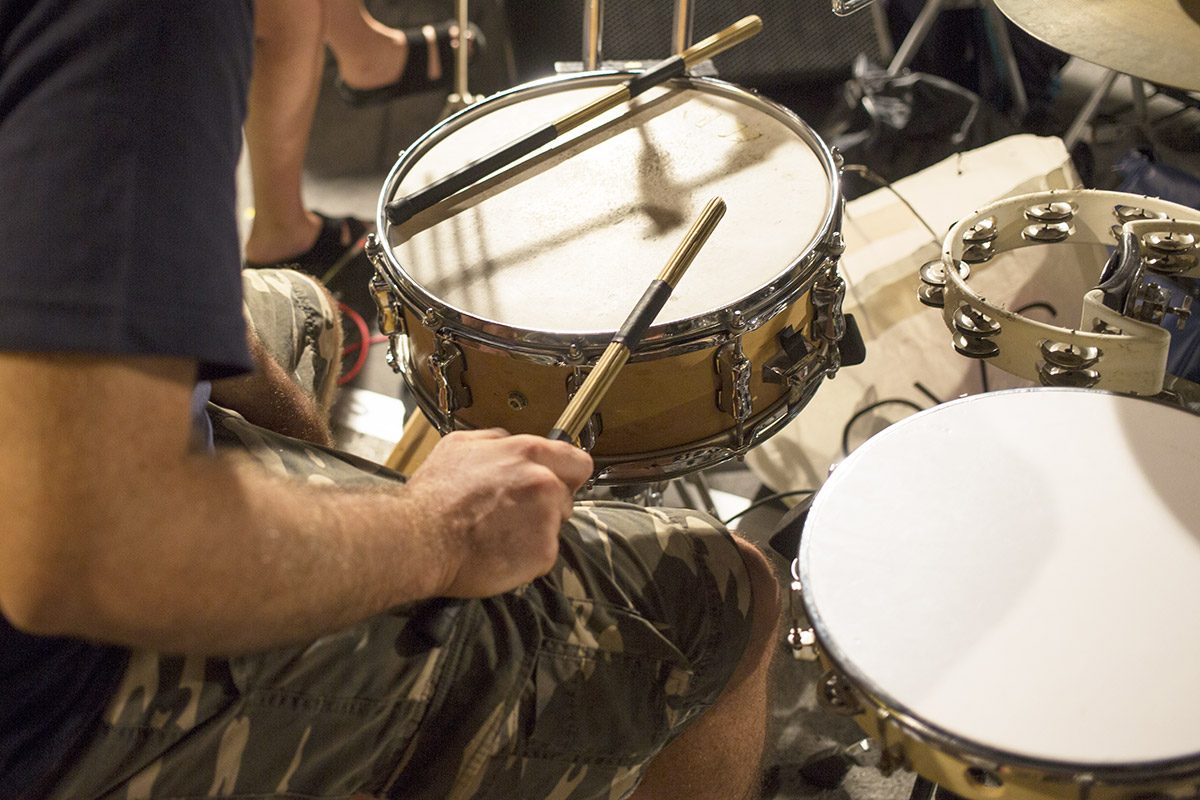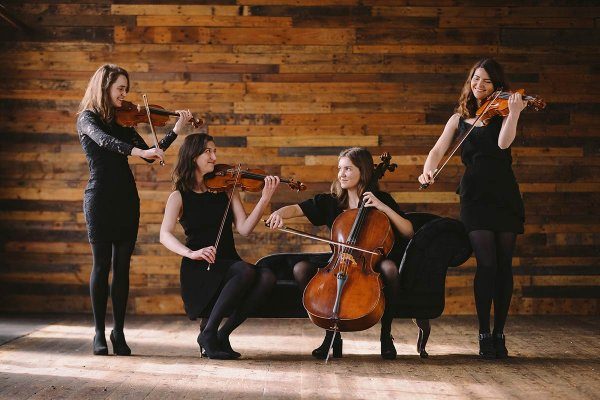
Sound Limiters: The Guide for Musicians, Venues & Clients
- Details
- blog
- Updated: 04th December 2023

The mere mention of sound limiters can often fill clients and bands with dread. With the fear of your guests being plunged into darkness and silence hanging over your special day, your vision of a perfect wedding day can quickly descend into a nightmare!
However, sound limiters themselves needn’t be so complicated, nor frightful. Below, we’ve put together a compelte guide on everything you need to know about noise limiters:
Quick Links
- What is a Sound Limiter?
- Why Do Venues Install Sound Limiters?
- Decibels (dB) & the Decibel Scale
- Are All Sound Limiters the Same?
- What Venues Need to Tell You Before You Book
- How Can Bands Accommodate Sound Limiters?
- Issues Musicians Face When Working with Sound Limiters
- Useful Advice on Booking the Right Live Music for Your Venue
Looking to Hire a Wedding Band?
Browse our extensive roster of wedding bands that specialise in working with sound limiters
What is a Sound Limiter?
To put it simply: a sound limiter monitors the sound level in a room via a built-in microphone, making sure it does not exceed a certain limit. The units used to measure ‘loudness’ are called decibels (dB).
If the noise in the room exceeds the pre-set limit for a certain amount of time (e.g. for more than 7-10 seconds) then the sound limiter will cut the power supply to the music. The venue’s staff will then have to reset the limiter in order to turn the power back on again.
Most limiters are fitted with a traffic light system to help warn musicians and staff when the noise is getting close to exceeding the limit. As long as this is visible, the musicians can keep their eye on this and adjust their levels discreetly (if needed) to avoid the power being cut.
However, if the band have cranked up their amps and the guests are all singing ‘Don’t Look Back In Anger’ at the top of their lungs, then the sound limiter may well cut the power. If tripped multiple times within a certain time frame, then it could take 15 minutes or longer to come back on again.
,
Why Do Venues Install Sound Limiters?
You may be surprised to hear that venues are not legally required to install a sound limiter, yet they’re becoming increasingly popular in the UK – and there are a number of reasons for why this is.
1. Noise Complaints
A venue can be subject to noise complaints from surrounding neighbours which could be deemed to be a statutory nuisance. This can lead to local councils setting up a sound control plan in order to minimise noise pollution.
2. Control of Noise at Work Regulations
Installing a limiter enables the venue to keep track of these levels to minimise noise complaints and avoid fines, prosecution or even worse – have their licence removed altogether!
Also, the venue have to be mindful of their staff working in these environments. Employers now have to uphold The Control of Noise at Work regulations 2005. This was put in place to help reduce the risk of employees suffering partial or total loss of hearing by controlling the noise they’re exposed to whilst working.
3. Protect Historic Buildings
Excessively loud noise can cause vibrations which in turn can cause damage to historical buildings. Many wedding venues may choose to install a limiter to protect their property and adhere to insurance terms.
Decibels (dB) & the Decibel Scale
The human ear is incredibly sensitive, which makes measuring sound rather odd. We can hear everything from a pencil being sharpened to a space shuttle being launched. So how can we compare different levels of loudness so that it all makes sense?
Decibels (dB) are the unit we use to measure sound. We refer to this as a logarithmic unit and basically means that a small increase in decibels indicates a large increase in intensity.
For example, 10dB is ten times more intense than 1dB...
...and 20dB is a hundred times more intense than 1dB.
The decibel scale was created to help measure these sounds in a way that we can make sense of it all. Below is a decibel scale comparison chart to help us understand this further:

Are All Sound Limiters the Same?
A very good question! There are actually two types of sound limiter: Automatic Volume Controllers & Electronic Sound Monitoring, and Mains Power Switching Units, both of which come in a variety of models and makes.
Automatic Volume Controllers & Electronic Sound Monitoring
Automatic Volume Controllers are connected between the sound source (e.g. an audio mixer or karaoke machine) and the main power amplifier. This requires bands to plug their gear into the limiter which will continually monitor the sound level and reduce the volume if the limit is exceeded. They are permanently installed at the venue and work in conjunction with an environmental noise control unit.
The band essentially have no control when using these types of sound limiters, which is why they are not the most popular to work with. If the limiter is incorrectly set, then this could trigger unnecessary power cuts to the band's gear and potentially damage equipment that’s connected to it, for example, laptops and valve guitar amplifiers.
Mains Power Switching Units (Most Popular)
The second type of limiter is the most common and the one we previously discussed. This works on a traffic light system, which will indicate when the levels are close to being exceeded (Green = okay, Amber = warning, Red = power will be cut soon if sustained). The decibel limit is set by the environmental health officer and depends on a multitude of factors such as the location of the venue and surrounding neighbours.
Zone Array / Sound Ceilings
You may also come across venues that have sound ceilings installed, often referred to as Zone Array systems. These systems use directionals speakers that essentially keep the music pointed at the dance floor as well as also helping to severely reduce the sound as it flows away from this area.
Many live bands prefer to avoid this type of set-up, as it can affect a band's energy and make it difficult to engage other guests in the room who are not on the dance floor. They are ideal for DJs and smaller venues that need to be very mindful of their surrounding neighbours. However, there are many bands who are fully equipped to work with them – you just might find it’s the rock & indie bands who politely decline playing at such venues.

What Venues Need to Tell You Before You Book
If your venue has a sound limiter installed, then it is their responsibility to make you aware of this prior to signing any contract. You should be informed of the type of limiter installed at the venue, how it is monitored and what dB limit it is capped at.
Trained venue staff should be present on the day who know how the sound limiter works. They should be able to explain to the musicians how it works and be able to reset it if it were to trip the power on the day.
TIPFind out who is in charge of running the event at your wedding and pass their name and contact details on to the band to liaise with before and on the day of the event.
Please also be aware that, when hiring live music to perform at your chosen venue, it will be your responsibility to make sure the musicians are aware of the venue’s sound restrictions prior to booking.
Most venues will have a document you can send across to the entertainment agency or band detailing the technical specification of the limiter installed. More often than not, the venue will also need the band or agent to sign this document to confirm they’re happy to adhere to their sound policies.

How Can Bands Accommodate Sound Limiters?
The good news is: there are plenty of bands out there that can accommodate sound limiters, but how do they achieve this?
Electric Drum Kit
An electric drum kit is the first port of call. An acoustic drum kit is usually the culprit when a limiter is set off (the snare to be precise!) so having an electric kit means the drummer can simply turn down the volume in order to keep within the desired parameters.
Brushes and 'Hot Rods'
Brushes and 'Hot Rods' are also a popular choice for percussionists. Brushes are typically used in jazz lineups, but can work nicely for a more ‘live lounge’ style set if your venue’s limits are particularly strict. Hot rods are the next best thing to normal drum sticks, as they still have a great sound but at a much lower volume.
The Cajon can be a last resort if the limiter in place is set to an incredibly low threshold. A Cajon is essentially a box that drummers sit on to produce percussive sounds, which makes it perfect for accommodating low-level sound limiters.
Direct input (DI) Instruments
Direct input (DI) is a great way for bassists to tackle those low-level frequencies. Bass amplifiers are often to blame for noise complaints, as lower frequencies travel much farther than higher frequencies. By using a DI, the bassist can control their lower frequencies with ease.
In-Ear Monitors (IEMs)
In Ear Monitors (IEMs) are a great way for a band to monitor and maintain their sound levels. It also means not having to use floor monitors, all of which can contribute to creating extra unwanted noise.

Issues with Sound Limiters and How to Fix Them
If you run a venue and are planning to install a sound limiter, there are a number of points to bear in mind to avoid issues. A common issue for musicians performing at venues with sound limiters is that the limiter itself has not been correctly installed. If a sound limiter isn't set correctly, it can affect the sensitivity of the limiter and make it difficult for a live band to work with.
Correct Limiter Settings
Ideally, the sound limiter should be on the A-weighted setting and preferably not on the C-weighted setting. The A-weighted setting essentially mimics the human ear and the frequencies we can perceivably hear. The C-weighted setting is used for peak measurements, so it’s much more sensitive and easily triggered.
Correct Microphone Placement
Sound limiters use a remote microphone – and the placement of this is absolutely key, as you do not want to have the band playing directly into this. Consider where the band will be placed on the day and make sure the microphone installed is at a healthy distance from them. The venue should be able to advise where best to place the band, as they will have had many bands play at their venue beforehand and should know what does and doesn’t work.
What Else Do Clients Need to Know?
If a sound limiter is set at a very low volume, you’ll need to be mindful of the fact that your guests could easily set it off as well. It only takes a loud cheer or applause at the end of a song to set off an extra sensitive limiter.
If live music is an important aspect of your wedding or party, always speak to potential venues before making a booking as you may find it's only brought up in the small print of their contract. It’s very difficult for 100-150 guests to enjoy themselves if a limiter is set at 80dB (quieter than a hairdryer) and so you may decide to look into an alternative venue.

Useful Advice on Booking the Right Live Music for Your Venue
Booking the right function band for your venue needn’t be complex, but there are some important points you should consider before you start looking.
Does your venue have a sound limiter? Be sure to find out exactly what is installed before approaching any bands, as they’ll need to know this information prior to booking.
What level is the limiter set at in dB? If the limiter is set lower than 110dB, then unfortunately you probably won’t be able to accommodate any brass instruments. If the limiter is set lower than 90dB, then you’ll most likely need to consider a wedding band that has an electric drum kit or Cajon to hand. If the limiter is set at 80dB or below then an acoustic act may be the way forward.
Does your venue allow acoustic drum kits to be used? If not, then you’ll need to make sure you find a band who can perform with electric drums (or no kit at all!).
A rock band will want to perform loudly, as they have a reputation to uphold, and rock music just doesn’t sound as good when played quietly. Because of this, they’re most likely going to politely turn away any venues that have sound limiters set any lower than 100dB.

Final Points
Musicians often take the blame when sound limiters go off, but in reality, it can be a combination of things. It’s worth remembering that any sound can set off a limiter, so it’s worth speaking in detail with your venue about their past events and the type of bands they can accommodate. If possible, it would be worth contacting past clients who’ve had bands perform there to check everything went smoothly for their event.
A band will always do their utmost to accommodate sound limiters, but you’ll find most musicians make it clear that it is the client’s responsibility if the limiter cuts out due to the aforementioned reasons above.
A band would never perform loudly on purpose to set off a limiter and will always do their best to accommodate the sound restrictions in place. It’s worth remembering that the venue and band both want your event to be the best it can be, so it’s vital to maintain excellent communication between the two to make sure your event goes off with a bang...not literally, of course!

If you’re a venue and have sound restrictions in place, why not get in touch – we have a wide variety of bands that can accommodate all types of sound limiters and we’d love to create for you your own personal page to send clients through to!







